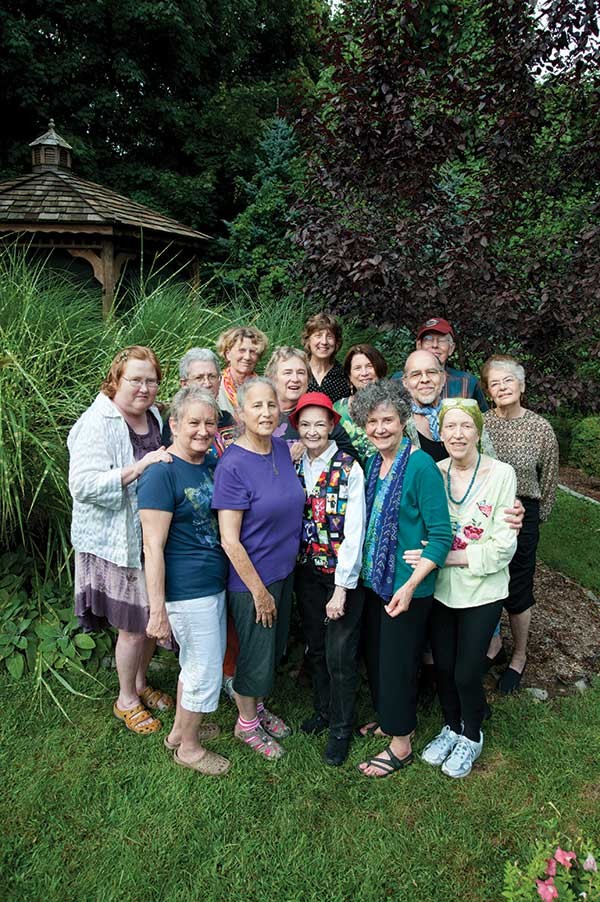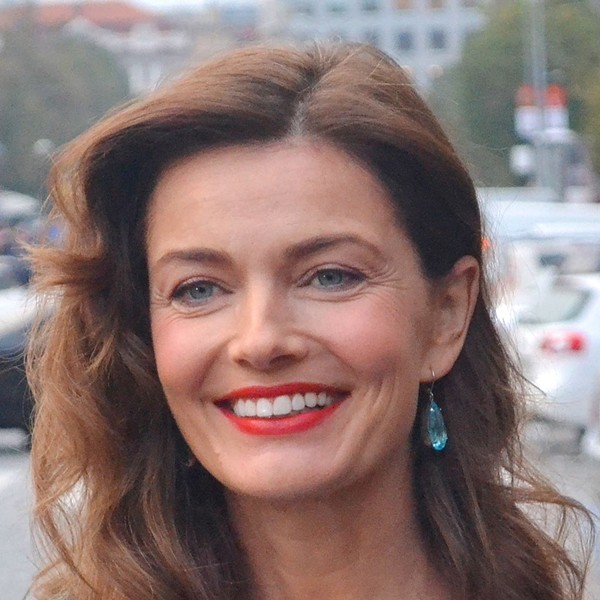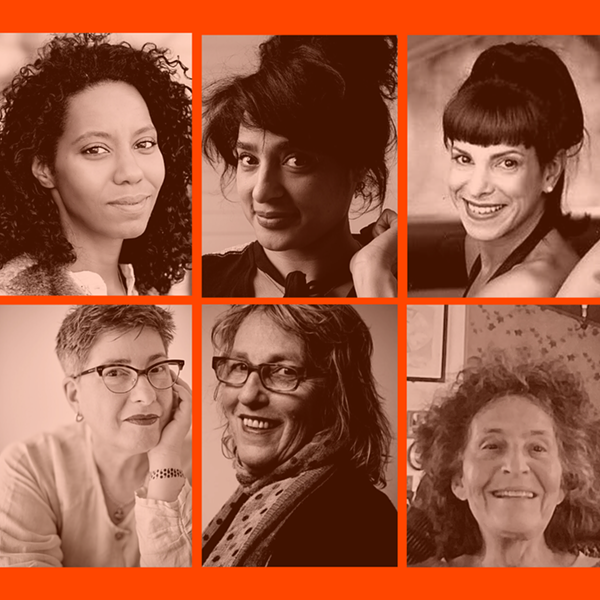
We are a storytelling species. Every human being has tales to tell, and the impulse to pass them along—both to loved ones and strangers—is primal. So is the urge to leave something behind when mortality calls. The remarkable new anthology holding on, letting go (OSP Memoir Group, 2013) collects stories by people who've learned to look death in the eye and to savor life's gifts. It's hard to imagine more meaningful work.
Abigail Thomas (A Three Dog Life; Safekeeping) leads the Memoir Group at Kingston's Oncology Support Program of the HealthAlliance of the Hudson Valley. In 2011, after her daughter was diagnosed with triple-negative breast cancer, the bestselling memoirist volunteered to lead a five-week writing workshop. Nearly two years later, it's still going strong, with a waiting list forming for a second group. "There was just so much talent," she says. "Extraordinary talent. How could you stop?"
The Oncology Support Program was founded by Barbara Sarah, a breast cancer survivor and one of holding on, letting go's 15 contributors. Now in its 20th year, OSP offers support groups and counseling, with Healing Arts programs in photography, theatre, art, writing, and music; Ellen Marshall MS, LCSW, is its director. For the past five years, this vibrant program has been housed in the Reuner Cancer Support House at 80 Mary's Avenue, across from the hospital.
The butterscotch-yellow house is modest and welcoming. Inside, the lighting is soft. There's a sectional couch draped with chenille and crochet throws, a coffee table with dishes of pretzels and fruit, a door to a deck overlooking a burgeoning garden. You might not notice it right away, but there's also a striking sculpture of a female torso with one full breast and a red rose where the second should be.
Three women sit on the couch, talking with the writer they all just call "Abby"—it's all first names here. Everyone wears dangly earrings and sensible shoes; a woman named Ruth is wearing a beautiful pastel silk headscarf. More writers arrive, trading news as they settle: Roberta's in the hospital, Bob is away on vacation, Perri's at Rosh Hashana services, Craig will be late. "None of us like to miss Thursday afternoons," explains Carol, who's bright-eyed and willowy. "Something's got to be wrong."
Every Thursday, this group—17 at last count—gathers to share work aloud. Most, though not all, have been writing for years; many have published in various genres. But this is different, a place where lives touch. You can sense the excitement and warmth in the room.
A strong-featured woman with a tumbleweed of blonde hair and big silver rings, Abby kicks off the meeting by reading three excerpts from books. "This is from My Struggle by Karl Ove Something-or-Other...Knausgaard. It's 800 pages of every sandwich he ever chewed and it's riveting." She reads a passage in which the writer watches a woman in a coffee shop and imagines what she's thinking. Then she gives a writing prompt for next week: "Two pages of what you don't think about in a coffee shop."
Abby's "two pages" assignments are legendary; her 2008 book Thinking About Memoir is full of them. She offers two more, both inspired by poems. (There are always three choices; the fourth choice is "anything you want.") Then she starts calling on writers. No one demurs, and only one person has not brought new pages.
The group keeps expanding. Phyllis and Marge arrive, dressed in bright colors, like tropical birds. They're followed by Craig, whose peppery beard and bandanna conceal scars he alludes to in his author bio: "After losing his vocal cords to cancer, he has found a new voice in Abigail Thomas's Oncology Support Memoir Group."
Just as Kathy starts reading, Nancy Henry enters, her husband pushing her wheelchair. She's followed by Marjorie, who's brought her white poodle and an armload of notebooks. "Are you supposed to be carrying all that crap?" someone asks her, concerned. "Oh, probably not," says Marjorie blithely. "I forget. Which is a good thing, till I feel stitches pulling." Everyone settles, and Kathy starts over. Each reading is met with appreciative sighs and a flurry of comments; heartfelt thank-yous are frequent.
Annie's piece portrays a beloved aunt with an impossible husband. "You show the dark and the light, and it's seamless," sighs Marjorie. Craig notes that the uncle is never named; a lively discussion ensues.
Sharon, a lesbian activist, reads a moving remembrance of a woman named Rita. Margie uses a flashlight to highlight the words on her pages, passing around her pencil illustrations. Phyllis reads about her husband catching a runaway horse by kneeling still and enticing it with a hand movement. She gets up to demonstrate what he was doing. "Could you all see that?" We could.
Nancy is next; she and Micky joined the group after the book was completed. It takes her a long time to dig through the tote bag of folders hanging off the arm of her wheelchair, and she apologizes. "I should have been more on top of this." She can't find the poem she wants, but picks two others. As soon as she starts reading, her breathy voice gains power. The first poem begins, "I measure time by the length of my hair," and ends, "When it rains, I taste its champagne." The second elicits such an impassioned response that Barbara Sarah trots upstairs to make copies for everyone.
Returning, she reads a piece about Rosh Hashana traditions and her evolving relationship to Judaism. Barbara's known for her earthy, comic riffs about body parts ("Dewlap" appears in holding on, letting go; the first one she wrote was about her bladder) but today's piece digs deeper. When Phyllis notes that Perri hated to miss today's group for services, Sharon offers, "I came because this is a life-giving experience in the spirit of the holiday." Heads nod, and someone echoes, "This is my church."
Craig reads about attending a food truck festival at Fiberflame. His piece begins, "I'm a little bit happy," which he attributes to pulled pork and beer. When he finishes, Abby flags a brief section that "goes soft in the middle," following up with a wide-eyed, "I didn't know they had pulled pork!" Everyone laughs.
Marjorie reads last, sharing a love letter to her late husband, her voice briefly beached by tears. "I always cry," she says with a no-big-deal shrug. In this room, it isn't. From Ruth's author bio: "Preparing an individual story to read to the group each week brings us the opportunity to share laughter and tears—both essential ingredients for healing."
No one can remember exactly when the anthology idea emerged. "We were all reading, and Abby said, 'God, this should be a book!'" is the closest anyone gets. It became a refrain: whenever a piece was especially strong, Abby would say, "Turn that in for the book." But nobody took concrete steps until a friend in OSP's Metastatic Support Group died.
"We said, let's not wait," Carol says. "Let's share the work and get it done." She, Craig, and Marjorie formed an organizing committee to research printing options. "Some of us operate from a more urgent place," Phyllis explains tactfully. "This group has many speeds, and the type A personalities swept along the slower ones, like a big wave."
Some of the book's pieces were chosen by Abby; writers were also encouraged to bring in work they especially wanted to print. Marjorie says, "It was important to us that it wouldn't all be about death and dying," and others concur. In fact, few of the pieces in holding on, letting go deal directly with cancer; some that do, like Carol's "The Wrong Line," are unexpectedly funny. Other topics range from childhood (Suzanne's "The Church Ladies") to marriage (Annie's poem "When Your Husband Leaves You with Every Section of the Times") and burial (Sharon's "Stopping Seven Times")—the whole gamut of lives fully lived.
"There's been a lot of singing in here, and laughing so hard we were all doubled over," says Abby. More than anything else, the work is honest. Renowned writer Anne Lamott (Bird by Bird) wrote a book-jacket quote that says in part, "You will never hold a book that is richer in love, life, death, family, the human heart, and humanity."
"When you walk into a house called Oncology Support Project, you've already dropped a lot of pettiness," says Sharon. Phyllis nods, adding, "We're writing about scars we didn't want anyone else to know we had, and the showing of the scars allows them to heal."
Annie agrees. "Everybody's vulnerable. It's scary to admit how vulnerable you've been. It's hard to go deep. I said so to Abby, and she said, 'I don't see that you have any choice.' It blew the ceiling right off."
"I think we're addicted," Carol says, grinning.
"But it's a good addiction," says Craig. "We're already planning another book."
Community Reading by the Memoir Group, 10/25 at 7pm in the Auditorium of the HealthAlliance Hospital, Mary's Avenue campus (formerly Benedictine Hospital), Kingston. $10 donation; $7 students/seniors; $5 OSP members. (845) 339-2071x 100. Also reading 11/2 at 6pm at Woodstock's Kleinert/James, sponsored by Golden Notebook. Pre-orders for the book are being taken now. Sign-up here.
















